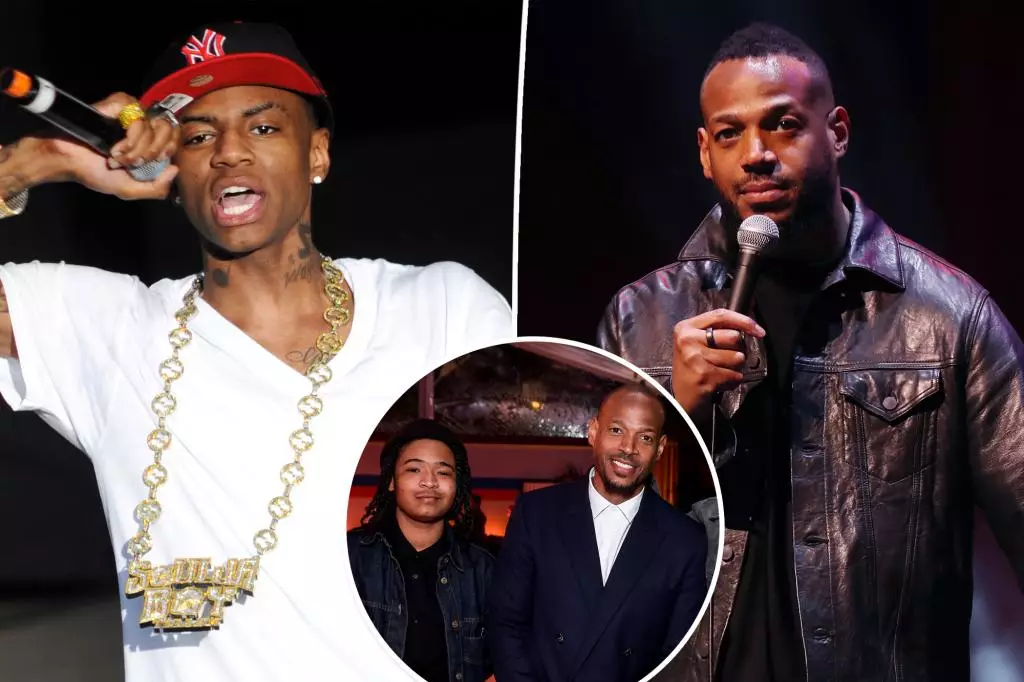The world of entertainment often thrives on feuds, with celebrities engaging in public spats that ignite discussions across social media platforms. Recently, a notable clash has surfaced between comedian Marlon Wayans and rapper Soulja Boy, captivating audiences with its chaotic blend of humor, offense, and comments on personal matters. As the feud spirals, it raises significant questions about respect, public discourse, and the responsibility that celebrities hold, especially when dealing with sensitive issues like gender identity.
The recent controversy ignited when Soulja Boy took to social media to disparage Wayans’ transgender son, Kai. Soulja’s choice of words included a hateful slur directed at Kai, which quickly drew sharp criticism. In a pointed rebuttal, Wayans responded by dismissing Soulja Boy’s relevance and condemning the rapper’s use of slurs, suggesting that if Soulja were more prominent in the music industry, he might face serious repercussions for his comments. This illustrates how comedians and artists often wield humor as a weapon, but it becomes troubling when they target marginalized groups. Wayans’ stance not only defended his son but also highlighted the broader societal implications of such language.
Wayans’ Advocacy for Acceptance
Marlon Wayans has been vocal about his support for his son’s transition. In a heartfelt public acknowledgment, he stated his initial struggle with acceptance before coming to terms with his child’s identity. His journey culminated in a powerful moment during Pride Month, where he showcased his support with pride symbols while affirming his role as a straight father. This representation is essential in an era where LGBTQ+ visibility remains crucial in the fight against discrimination. Wayans actively challenges toxic masculinity, advocating for love and acceptance within tight-knit family units. His social media posts radiate an attitude of defiance against those who spread hate, reinforcing the idea that family love transcends societal norms and prejudices.
The ongoing feud between Wayans and Soulja Boy serves as a reminder of how public conflicts often blur personal lines. Wayans’ jabs at Soulja Boy’s waning career can be viewed as not just humorous retorts but also reflections of deeper frustrations about maintaining relevance in an ever-changing industry. Soulja Boy’s rebuttals, often steeped in aggressive language, though emotionally charged, detract from the more significant issues at play, such as bolstering respect for individuals’ identities. What began as a comedic exchange quickly turned into a damaging spectacle; it illustrates how insecurities and personal failures can manifest through public tirades.
Humor vs. Responsibility
What stands central in this ongoing debacle is the juxtaposition of humor and personal responsibility. While comedians often thrive on pushing boundaries for laughs, Wayans’ decisions to address sensitive topics with care stand out. In contrast, Soulja Boy’s flippant approach to insults veers into dangerous territory, particularly when discussing sensitive issues such as gender identity. The backlash he faces underscores the importance of accountability for personal remarks, especially from individuals with significant influence. The conversation extends beyond these two personalities; it invites scrutiny of how humor is used and the implicit responsibility that comes with public notoriety.
A Call for Dialog
Ultimately, this exchange between Wayans and Soulja Boy illustrates a need for more constructive dialogues rather than inflammatory exchanges. The discourse surrounding LGBTQ+ issues requires sensitivity and understanding, not casual dismissals or hateful slurs. As society progresses toward greater inclusion, public figures should aim to facilitate conversations that promote acceptance rather than division. The feud could potentially serve as an educational moment, reminding audiences of the impact words carry and the importance of compassion in even the most charged confrontations.
The escalating feud ultimately exhibits the duality of celebrity culture—where humor is often weaponized, but also where genuine advocacy can provoke personal insights. Wayans’ dedication to his child and the emotional labor involved in public discourse about identity deserves recognition, even amidst the waves of discontent surfacing from Soulja Boy’s misguided jabs. As this narrative unfolds, it encapsulates the complexities of modern fame and the critical need for empathy in public discourse.

